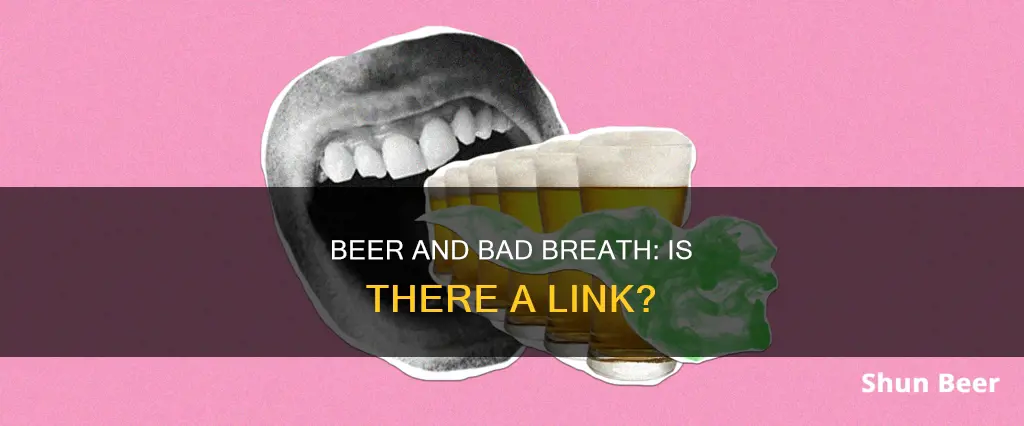
Drinking beer can indeed cause bad breath. Alcohol consumption can lead to a decrease in saliva production, creating an environment where odour-causing bacteria can thrive. Beer, like other alcoholic drinks, can also alter the balance of bacteria in your mouth, leading to a higher concentration of bad bacteria linked to gum disease and an increase in bacteria from the genus Neisseria, which produce the carcinogen acetaldehyde. These changes in oral bacteria may contribute to alcohol-related diseases, including periodontal disease, head and neck cancer, and digestive tract cancers. Therefore, drinking beer can be a contributing factor to bad breath.
| Characteristics | Values |
|---|---|
| Alcohol consumption | Drinking alcohol can cause bad breath due to the decrease in saliva production, which allows odor-causing bacteria to flourish. |
| Saliva production | Alcohol consumption leads to a reduction in saliva, causing dry mouth. This creates an ideal environment for odor-causing bacteria to multiply. |
| Bacteria | Alcohol alters the balance of bacteria in the mouth, killing off "good" bacteria and allowing potentially harmful bacteria to flourish. |
| Gum disease | The imbalance of bacteria caused by alcohol consumption increases the risk of gum disease, which is a known cause of bad breath. |
| Acid reflux | Alcohol can trigger acid reflux, causing stomach acid to move up into the throat, resulting in odor. |
| Cancer and heart disease | The altered oral microbiome caused by alcohol consumption has been linked to an increased risk of cancer and heart disease. |
What You'll Learn

Alcohol kills good bacteria
Alcohol consumption is a common cause of bad breath. Drinking alcohol, especially in excess, can significantly reduce saliva production, creating an environment that enables odour-causing bacteria to thrive.
A 2018 study published in the journal Microbiome found that alcohol consumption is associated with an increased number of "bad" bacteria in the mouth, which can lead to gum disease and cavities. The study analysed the bacterial profiles of spit samples from over 1,000 healthy volunteers aged 55 to 84 and found that those who consumed alcohol had higher levels of bacteria linked to gum disease and lower levels of Lactobacillales, a bacterial order linked to better oral health.
The study also revealed that alcohol consumption may contribute to the development of alcohol-related diseases, including periodontal disease, head and neck cancer, and digestive tract cancers. Jiyoung Ahn, an epidemiologist at NYU Langone Health's Perlmutter Cancer Center, stated that the study provides "clear evidence that drinking is bad for maintaining a healthy balance of microbes in the mouth."
Alcohol kills off many "good" bacteria, allowing potentially harmful bacteria to flourish. Specifically, alcohol consumption leads to a decrease in Lactobacillales, a beneficial type of bacteria that can reduce the risk of cavities. In contrast, drinkers tend to have higher levels of Streptococcus, Actinomyces, Leptotrichia, Cardiobacterium, and Neisseria, all of which are considered potentially harmful.
Additionally, alcohol can trigger acid reflux, causing stomach acid to creep up into the throat, which can also contribute to bad breath. Therefore, it is essential to maintain a healthy balance of oral bacteria and practice good oral hygiene to prevent bad breath and maintain optimal oral health.
Do Sulfite Wands Really Work for Beer?
You may want to see also

Beer drinkers have different bacteria to non-drinkers
Alcohol consumption can cause bad breath, and beer is no exception. Drinking beer can lead to a decrease in saliva production, creating an environment where odour-causing bacteria can flourish.
A study published in the journal Microbiome found that drinking alcohol can disrupt the balance of "good" and "bad" bacteria in the mouth. This imbalance can increase the risk of gum disease, cavities, and even cancer and heart disease. The study also found that drinkers had less abundant populations of Lactobacillales, considered "good" bacteria, and more abundant populations of Streptococcus, Actinomyces, Leptotrichia, Cardiobacterium, and Neisseria, considered potentially harmful.
While the specific mechanics of how alcohol affects the bacteria in the mouth are still being studied, the evidence suggests that beer drinkers may indeed have different oral bacteria compared to non-drinkers, which could contribute to bad breath.
Breastfeeding and Beer: What's Safe?
You may want to see also

Alcohol can cause acid reflux
Alcohol consumption is a common cause of bad breath. It can alter the balance of bacteria in your mouth, leading to an increased risk of gum disease and cavities. Additionally, alcohol can trigger acid reflux, allowing stomach acid to creep up into the throat, causing an odour.
When you drink alcohol, it can relax the lower oesophageal sphincter, a muscle that acts as a valve between the oesophagus and the stomach. Normally, this muscle remains closed, preventing stomach contents from flowing back up. However, alcohol consumption can cause this muscle to relax, allowing stomach acid to move upwards.
Additionally, alcohol can irritate the oesophagus and stomach lining, increasing the production of acid. This excess acid can then reflux back up into the oesophagus and throat, causing a burning sensation and an unpleasant odour.
The effects of alcohol on acid reflux can vary from person to person. Some people may experience acid reflux only occasionally after drinking, while others may have more frequent or severe symptoms. It's important to note that chronic acid reflux can also be a sign of other underlying health conditions, so if you experience persistent symptoms, it's advisable to consult a healthcare professional.
To reduce the risk of alcohol-induced acid reflux, it's recommended to drink in moderation or avoid alcohol altogether. Additionally, avoiding carbonated alcoholic beverages and drinking slowly can help minimise the impact on the lower oesophageal sphincter. Maintaining a healthy weight, avoiding large meals, and not lying down right after eating can also help reduce the occurrence of acid reflux.
Warm Beer: To Drink or Not?
You may want to see also

Alcohol reduces saliva production
Alcohol consumption is a common cause of bad breath. Drinking alcohol, especially in excess, can lead to a decrease in saliva production, creating an environment that promotes the growth of odour-causing bacteria. This reduction in saliva can result in dry mouth, allowing bacteria to linger for up to 10 hours after drinking.
Saliva plays a crucial role in maintaining oral hygiene by removing food particles and keeping the mouth clean. When saliva production decreases, it creates an ideal environment for odour-causing bacteria to thrive. This imbalance of bacteria can lead to a higher risk of gum disease and cavities.
Additionally, alcohol can affect the balance of "good" and "bad" bacteria in the mouth. It kills off many "good" bacteria, such as Lactobacillales, which are linked to better oral health, and allows potentially harmful bacteria, such as Streptococcus and Neisseria, to flourish. These harmful bacteria can contribute to alcohol-related diseases, including periodontal disease and digestive tract cancers.
The impact of alcohol on saliva production and the oral microbiome can lead to bad breath. The more frequently and heavily a person drinks, the more likely they are to experience bad breath and the potential health risks associated with altered oral bacteria.
To counteract the effects of alcohol on saliva production, staying hydrated by drinking water can help. Water is essential for maintaining adequate saliva production, as it is 99% water. It also helps wash away food particles and keeps the mouth clean, reducing the risk of bad breath and promoting better oral hygiene.
Ginger Beer and Pregnancy: Is It Safe to Drink?
You may want to see also

Alcohol lingers in the mouth for up to 10 hours
Alcohol consumption can lead to bad breath, and not just because of its strong smell. It can cause a decrease in saliva production, creating an environment where odour-causing bacteria can flourish.
Alcohol doesn't just affect your breath while you're drinking it, either. It can linger in your mouth for up to 10 hours after you finish drinking, allowing bacteria to build up. This can increase your risk of gum disease and cavities, as well as more serious issues like cancer and heart disease.
The reason alcohol has such a long-lasting effect is that it is processed by the body in a way that causes excess urination, dehydrating you and drying out your mouth. This is exacerbated by the fact that alcohol also decreases saliva production, giving bacteria an ideal environment in which to multiply.
To combat alcohol-induced dry mouth, it's recommended to drink a glass of water between alcoholic drinks and to stay hydrated by drinking plenty of water the next day. Brushing your teeth after drinking can also help to remove bacteria from your mouth and reduce bad breath.
While drinking in moderation and choosing simpler drinks, like beer or wine, can help to reduce the smell of alcohol on your breath, the only way to completely avoid alcohol breath is to abstain from drinking altogether.
Beer Drinking: A Daily Habit That Can Kill You
You may want to see also
Frequently asked questions
Yes, drinking beer can cause bad breath. Alcohol consumption can cause a decrease in saliva production, creating an environment for odour-causing bacteria to multiply in the mouth.
Alcohol consumption can cause a decline in saliva production, which allows odour-causing bacteria to flourish in the mouth. Additionally, drinking beer can alter the balance of bacteria in your mouth, increasing the risk of gum disease, a common cause of bad breath.
To prevent bad breath after drinking beer, it is recommended to stay hydrated by drinking water, as water helps wash away food particles and bacteria that contribute to bad breath. Maintaining good oral hygiene by regularly brushing, flossing, and using mouthwash can also help prevent bad breath.







